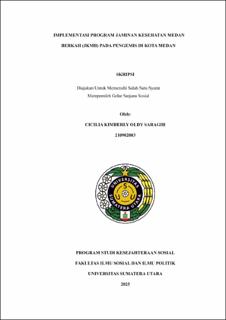| dc.description.abstract | Equal access to health services is a fundamental right of citizens. However,
vulnerable groups such as beggars are often neglected because they do not have
valid residence documents. The Medan City Government launched the Medan
Berkah Health Insurance Program (JKMB) to support universal Health Coverage,
allowing free health services only with a Medan ID card. This study aims to assess
the implementation of JKMB on beggars in Medan City by using the implementation
suitability model from David C. Korten, which emphasizes the relationship between
programs, organizations, and beneficiaries. The method used is a descriptive
qualitative approach, with data collection through in-depth interviews,
observations, and documentation studies. Informants consisted of beggars without
identity who had been disciplined by Social Services, program Implementation
officers, and academics in the field of social welfare. The results showed that JKMB
can only be accessed by beggars while under the supervision of Social Services,
through temporary identities such as "Mr. X". After being repatriated
(reunification), access to health services cannot be continued due to the absence of
An ID. The Program has not been able to reach marginalized groups on an ongoing
basis, and there has been no integration of cross-sector data systems. The findings
expose the discrepancy between program design and Target conditions,
highlighting the importance of more inclusive policy reformulation, facilitation of
identity ownership, and inter-agency coordination to create equitable and
sustainable health access for all citizens. | en_US |


